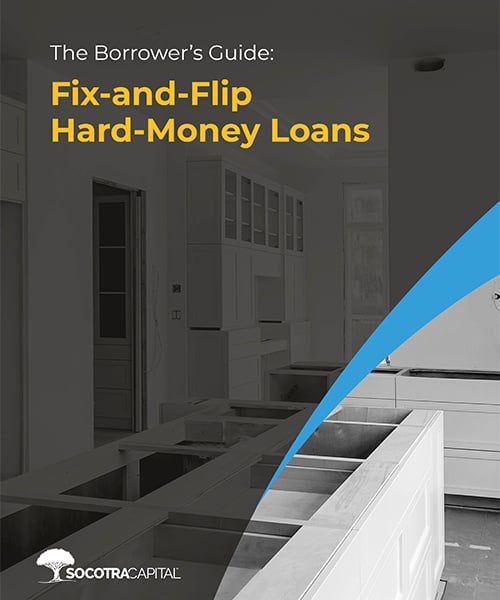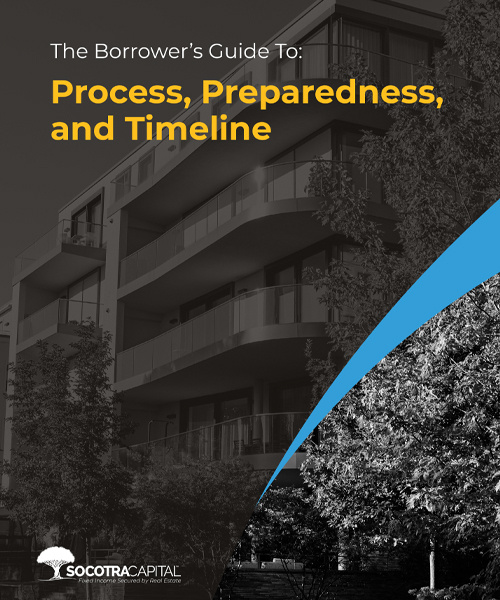Learn About Direct Lending
Learn from our experience working with the best! We've seen it all, whether you're an investor, broker, borrower, or vendor.


Portal Access
Access Our RIA Portal
If you’re a registered investment advisor (RIA), please fill out the form to view our comprehensive resources for RIAs. These products are suitable only for accredited investors.

Guide
The Borrower’s Guide: Fix-and-Flip Hard Money Loans
Enterprising investors know that with a good eye for opportunity, enough cash, and a little elbow grease, the right property can generate quick profits or long-term passive income.

Portal Access
Access the Socotra Investor Center
Accredited investors can sign up for access to the Socotra Investor Center and get one-click access to our investor newsletter archive, the latest Socotra prospectuses, and educational content—all in one place.

Guide
Building a Resilient Portfolio
Exploring alternative investments with the help of a Certified Financial Planner (CFP) or Registered Investment Advisor (RIA) is a step in the right direction.

Guide
Hard Money 101: A Guide for Real Estate Agents, Mortgage Bankers, and Commercial Brokers
Download our free guide to learn more about the hard money options you can provide your clients.

Guide
How to Grow a Passive Income Portfolio in Today's Market
This guide helps you learn how to find the right deal, how to finance it, and how to overcome some of the most common challenges.

Guide
The Borrower’s Guide: Process, Preparedness, and Timeline
This guide explores some of the most common types of hard money loans, when it makes sense to get them, and what you need to know before deciding which type of loan is right for you.

Guide
The Borrower’s Guide: Hard Money for a Buy and Hold Investor
This guide explains the various types of buy and hold loans, when it’s a good idea to work with a private lender, and what questions to ask when making borrowing decisions.

Guide
The Ultimate Guide to Navigating the Real Estate Market in Any Economic Season
This guide describes the typical economic seasons and how real estate investors can capitalize on them. We can’t predict the future, but we can help you better see the storm clouds or sunny skies ahead.

Guide
Navigating Market Volatility for RIAs: Proven Strategies to Safeguard and Grow Client Investments
This guide explores how to build a resilient portfolio to manage risk and grow client investments for your clients—even in a volatile market.

Article
Which Hard Money Loan Is Right for You?
Download our free infographic to learn more about the hard money loan types you can get from Socotra Capital.

Guide
The Ultimate Guide to Navigating the Real Estate Market in Any Economic Season
This guide explores how the economic cycle impacts the real estate market and how you can capitalize on predictable shifts.

Guide
How to Grow a Passive Income Portfolio in Today’s Market
Download our free guide to gain valuable insight into growing passive income in a smarter—not harder—ways!

Application
Short-Form Application for Hard Money Loans
Fill out our application to start the fast, easy process of getting the cash you need to get your project underway.

Application
Mortgage Broker Approval Form
Fill out our application to start the fast, easy process to establishing a great partnership!

Portal Access
Access Our Investor Portal
If you are an accredited investor, fill out the form to view our complete investor guide.

Article
Real Estate Is Moving Fast!
If you have an opportunity to purchase and need money fast, get in touch with Socotra Capital,, and we'll help you pounce on that can't-miss opportunity!
There are no results.
Get started today.
Fill out our online form to learn more about hard money loans.
